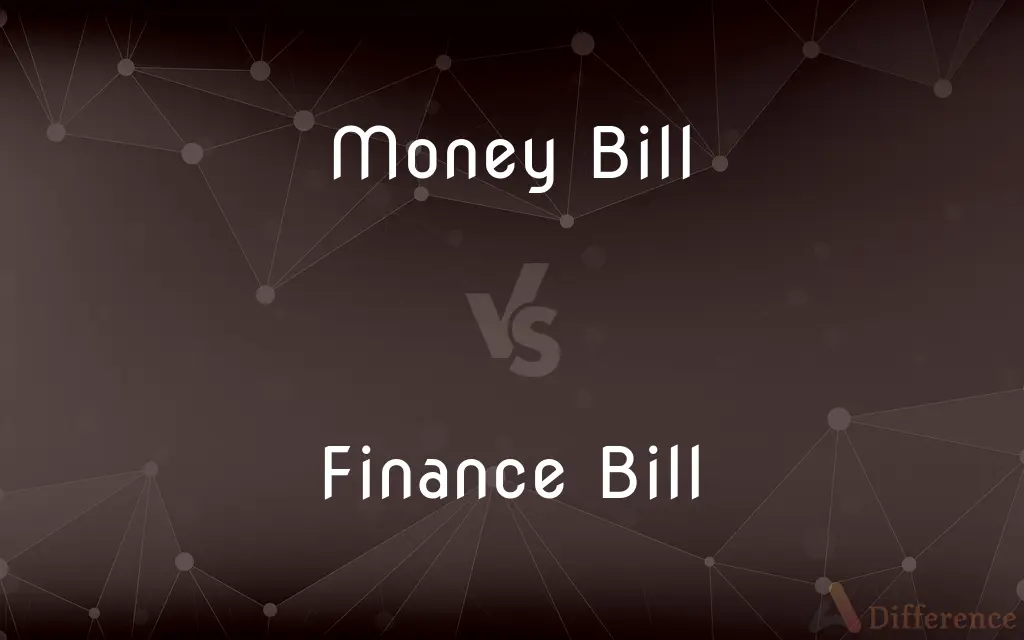Money Bill vs. Finance Bill — What's the Difference?
By Tayyaba Rehman — Published on November 9, 2023
A Money Bill pertains exclusively to national taxation and expenditure, whereas a Finance Bill covers fiscal proposals, including taxation and expenditure, but also contains other provisions.

Difference Between Money Bill and Finance Bill
Table of Contents
ADVERTISEMENT
Key Differences
A Money Bill, as the name suggests, strictly revolves around issues of the country's monetary matters, specifically the imposition, abolition, remission, alteration, or regulation of taxes, or the regulation of the borrowing of money or its custody. On the other hand, while a Finance Bill also encompasses taxation, it is more comprehensive. A Finance Bill carries the government's fiscal proposals for the upcoming financial year.
Understanding the distinction between the Money Bill and Finance Bill is crucial in grasping the legislative procedures in many countries. The passage of a Money Bill holds unique provisions in legislatures; for instance, it can be introduced only in the lower house and must be passed within a specific time frame. The Finance Bill, encompassing a broader range of fiscal matters, undergoes more general legislative scrutiny and includes elements that may not be strictly related to the country's finances.
It is essential to note that every Money Bill is a Finance Bill, but not vice versa. This is because while the Money Bill focuses narrowly on core financial matters, the Finance Bill can contain various other provisions, which might not strictly fall under the category of financial undertakings. These could be related to any other legislative business deemed essential by the government.
In summary, while both the Money Bill and Finance Bill play pivotal roles in a nation's fiscal and economic framework, they differ significantly in their scope and legislative passage. The Money Bill remains confined to core financial topics, while the Finance Bill has a more expansive nature.
Comparison Chart
Scope
Exclusive to taxation and expenditure.
Covers fiscal proposals, including non-fiscal matters.
ADVERTISEMENT
Legislative Procedure
Specific provisions for introduction and passage.
General legislative scrutiny.
Content
Strictly financial matters.
Broad range, including non-financial provisions.
Relation
Always a Finance Bill.
Not necessarily a Money Bill.
Initiation
Typically initiated in the lower house of the legislature.
Can be initiated as per standard legislative procedures.
Compare with Definitions
Money Bill
A bill strictly related to national revenue and withdrawals.
The reduction in defense spending was outlined in the latest Money Bill.
Finance Bill
Legislation presenting the government's budgetary proposals.
The Finance Bill included provisions beyond mere taxation, such as trade regulations.
Money Bill
A legislative proposal centered on the nation's financial matters.
Tax reforms for corporations were a major highlight of the Money Bill.
Finance Bill
A legislative proposal encapsulating all financial matters, including non-fiscal provisions.
The Finance Bill had elements addressing both tax rates and digital currency regulations.
Money Bill
Legislation that exclusively handles the government's monetary transactions.
The allocation of funds for infrastructure was detailed in the Money Bill.
Finance Bill
Legislation that broadly covers a nation's financial blueprint, including tangential matters.
Alongside tax reforms, the Finance Bill introduced new labor laws.
Money Bill
Legislation solely concerning taxation and government expenditure.
The proposed healthcare changes were introduced as part of the Money Bill.
Finance Bill
A comprehensive bill detailing fiscal policies and other related provisions.
Reforms in the banking sector were a surprise inclusion in the Finance Bill.
Money Bill
A bill that exclusively deals with the country's treasury.
The Money Bill featured changes to various federal tax brackets.
Finance Bill
A bill introducing the government's fiscal strategy and accompanying provisions.
The Finance Bill detailed strategies to counter the economic recession.
Common Curiosities
Where can a Money Bill be introduced?
Typically, a Money Bill is introduced in the lower house of the legislature.
How is a Money Bill passed in the legislature?
Money Bills have specific legislative provisions and timelines for passage.
What is a Money Bill?
A Money Bill exclusively pertains to national taxation and expenditure.
What happens if a Finance Bill is not passed?
If not passed, the government's budgetary proposals might not come into effect, potentially leading to governmental crises in some countries.
Can a Finance Bill introduce new laws unrelated to finance?
Yes, a Finance Bill can include provisions not strictly related to finance.
Is every Money Bill considered a Finance Bill?
Yes, every Money Bill is a Finance Bill, but not all Finance Bills are Money Bills.
Why is the distinction between the two bills crucial?
The distinction helps in understanding their legislative procedures and scope.
What happens if there's disagreement on a Money Bill between legislative houses?
Procedures vary, but often the lower house's decision on a Money Bill is final.
How does a Finance Bill differ from a Money Bill?
A Finance Bill covers fiscal proposals, including non-fiscal provisions, while a Money Bill is strictly about financial matters.
Can a Finance Bill include trade regulations?
Yes, a Finance Bill can cover a wide range of provisions, including trade regulations.
What's the primary objective of a Money Bill?
The main objective is to address the country's core financial matters.
Does a Finance Bill always include tax proposals?
While often about fiscal matters, a Finance Bill can include other provisions as well.
Can a Finance Bill be rejected by the legislature?
Yes, like other bills, a Finance Bill can be debated, amended, or rejected.
Can non-fiscal matters in a Finance Bill be extensive?
Yes, a Finance Bill can contain numerous non-fiscal provisions, depending on the government's agenda.
Does a Finance Bill always come post the budget presentation?
Typically, a Finance Bill is presented after the budget detailing the fiscal proposals.
Share Your Discovery

Previous Comparison
Phase of Matter vs. State of MatterNext Comparison
Silica vs. Silicon DioxideAuthor Spotlight
Written by
Tayyaba RehmanTayyaba Rehman is a distinguished writer, currently serving as a primary contributor to askdifference.com. As a researcher in semantics and etymology, Tayyaba's passion for the complexity of languages and their distinctions has found a perfect home on the platform. Tayyaba delves into the intricacies of language, distinguishing between commonly confused words and phrases, thereby providing clarity for readers worldwide.













































